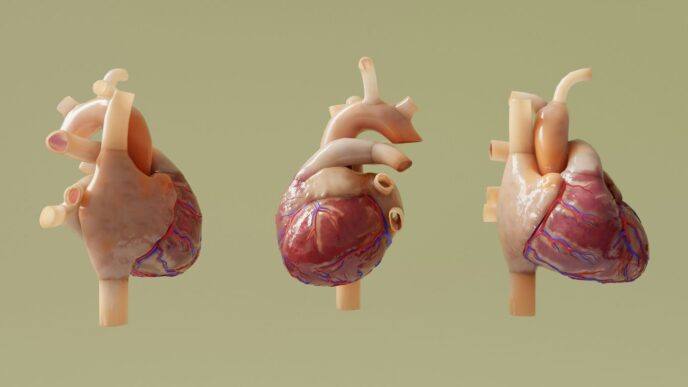Living a breast cancer-free life is a journey, not just a destination. After treatment, a new chapter opens, filled with relief but also new questions. This guide is here to help you navigate that path, focusing on staying healthy, feeling good emotionally, and finding meaning. It’s about embracing each day with hope and practical strategies for a vibrant future, truly living a breast cancer-free life.
Key Takeaways
- Embrace each day fully, finding joy and living in the moment, even after treatment ends.
- Stay aware of your body and don’t hesitate to seek second opinions or advocate for your health needs.
- Manage stress and anxiety, like ‘scanxiety,’ by leaning on your support network and maintaining a positive outlook.
- Nourish your body with good food, stay active, and prioritize rest to support your overall well-being.
- Discover new purpose by sharing your story, advocating for others, and focusing on what brings meaning to your life.
Embracing a Breast Cancer-Free Future

So, you’ve heard the words, "cancer-free." It’s a huge relief, right? But it’s also the start of something new, a whole new chapter. It’s totally normal to feel a mix of emotions – joy, sure, but maybe a little bit of unease too. This is where we start looking forward, not just past what happened, but towards a life that feels full and healthy.
Living One Day At A Time
After treatment wraps up, it’s easy to think everything should just snap back to normal. But life after cancer often has its own rhythm. For many, it’s about finding a way to stay aware of your health without letting worry take over. Think of it like this: you’re still the driver of your own well-being, but you’re not constantly looking in the rearview mirror. It’s about acknowledging that follow-up appointments and check-ins are important, but also making a conscious effort not to let the ‘what ifs’ consume your present.
- Schedule regular check-ups: These are your opportunities to catch anything early.
- Listen to your body: You know yourself best. If something feels off, don’t hesitate to speak up.
- Practice mindfulness: Techniques like deep breathing or short meditations can help ground you in the present moment.
It’s a delicate balance, this new phase. You’ve earned the right to feel a sense of peace, but staying connected to your health journey is part of that. It’s about being proactive, not anxious.
Adopting A Carpe Diem Attitude
Once you’ve been through cancer treatment, the idea of
Staying Vigilant For Your Health
Even after treatment ends and you get the "all clear" from your doctor, staying on top of your health is a continuous journey. It’s about being aware and proactive, not letting worry take over, but rather using that awareness to live well. Think of it as being a good detective for your own body.
Recognizing Warning Signs Of Recurrence
Sometimes, even when everything looks good, your body might send signals that something’s up. It’s important to know what to look out for. These aren’t meant to scare you, but to help you act quickly if needed. Keep a mental note, or even a physical one, of any changes you notice.
- New lumps or thickenings: This could be in your breast or under your arm.
- Changes in breast size or shape: Noticeable differences that weren’t there before.
- Skin changes: Things like dimpling, redness, or puckering on the breast skin.
- Nipple changes: Inward pulling, discharge (other than breast milk), or sores.
- Persistent pain: Pain in one specific area that doesn’t go away.
It’s easy to dismiss new aches or pains, especially when you’re trying to get back to normal life. But if something feels off, or if a symptom persists for more than a couple of weeks, it’s worth getting it checked out. Don’t hesitate to call your doctor.
Advocating For Your Healthcare Needs
Your voice matters in your healthcare journey. Don’t be afraid to ask questions, express concerns, or seek clarification. You know your body best, and advocating for yourself means ensuring you get the care and attention you deserve.
- Prepare for appointments: Jot down questions beforehand so you don’t forget.
- Be specific: Clearly describe any symptoms or changes you’re experiencing.
- Ask for explanations: If you don’t understand something, ask your doctor to explain it in simpler terms.
- Follow up: If you’re told to monitor something, make sure you do and report back any changes.
The Importance Of Second Opinions
Getting a second opinion isn’t about doubting your doctor; it’s about gaining more information and peace of mind. Different doctors might have slightly different perspectives or suggest alternative approaches. It’s a smart step to ensure you’re comfortable with your treatment plan and have explored all reasonable options.
- When to consider: If your diagnosis is serious, if treatment options are complex, or if you simply feel unsure.
- How to get one: Ask your current doctor for a referral, or research specialists in your area.
- What to bring: Have your medical records and test results ready to share.
Cultivating Emotional Well-being

After going through cancer treatment, it’s totally normal to feel a mix of emotions. You might feel relieved, but also anxious about what’s next. It’s like your body has been through a war, and now you’re trying to figure out how to live in the peace that follows. This section is all about giving yourself the space and tools to heal emotionally, not just physically.
Managing Scanxiety And Stress
Let’s be real, the time leading up to and following medical tests, especially scans, can be a real gut-punch. It’s often called ‘scanxiety,’ and it’s that knot in your stomach that tightens with every passing day. It’s not just in your head; it’s a very real feeling that many survivors experience. Finding ways to manage this stress is super important for your overall recovery.
- Practice Deep Breathing: Seriously, just taking a few slow, deep breaths can calm your nervous system. Try inhaling for a count of four, holding for four, and exhaling for six. Repeat this a few times.
- Mindfulness and Meditation: Even just five minutes a day can make a difference. There are tons of free apps and guided meditations online that can help you focus on the present moment, rather than worrying about future scan results.
- Gentle Movement: A walk in nature, some light stretching, or yoga can help release physical tension that often comes with stress.
- Journaling: Writing down your fears and worries can help you process them. Sometimes seeing them on paper makes them feel less overwhelming.
It’s okay to feel scared or worried. Acknowledging these feelings is the first step to moving through them. You don’t have to be strong all the time.
Leaning On Support Systems
Nobody gets through something like cancer alone. Your support system is your lifeline. This includes family, friends, support groups, and even therapists. Don’t be afraid to ask for help or to lean on the people who care about you.
- Talk to Loved Ones: Share your feelings with trusted friends and family. Sometimes just talking about what you’re going through can be incredibly cathartic.
- Join a Support Group: Connecting with others who have similar experiences can be powerful. You can share tips, offer encouragement, and realize you’re not alone in your struggles.
- Seek Professional Help: A therapist or counselor can provide tools and strategies for coping with the emotional toll of cancer and its aftermath.
- Accept Help: If someone offers to bring you a meal, run an errand, or just sit with you, say yes! People want to help, and letting them is a gift to them too.
Maintaining An Optimistic Outlook
This is a tough one, I know. After everything, it can be hard to see the bright side. But focusing on the positive, even in small ways, can really shift your perspective. It’s not about ignoring the bad stuff, but about making room for the good too.
- Gratitude Practice: Each day, try to identify one or two things you’re thankful for. It could be as simple as a sunny day or a good cup of coffee.
- Focus on What You Can Control: You can’t control everything, but you can control your reactions and your daily choices. Focus your energy there.
- Set Small, Achievable Goals: Accomplishing even minor tasks can boost your sense of capability and optimism.
- Engage in Enjoyable Activities: Make time for hobbies and activities that bring you joy and a sense of purpose. This helps remind you of the good things in life.
Remember, cultivating emotional well-being is an ongoing process. Be patient with yourself, celebrate small victories, and know that you are capable of finding peace and happiness after cancer.
Strategies For A Healthy Lifestyle
Taking care of yourself after breast cancer treatment isn’t just about the big medical stuff; it’s also about the everyday choices that add up. Think of it as building a stronger foundation for your future. It’s about finding what makes you feel good, physically and mentally, and making it a regular part of your life. This isn’t about perfection, but about progress and finding a balance that works for you.
Nourishing Your Body With Healthy Foods
What you eat plays a big role in how you feel. It’s not about strict diets, but more about choosing foods that give you energy and support your body’s recovery. Focusing on whole, unprocessed foods is generally a good idea. This means lots of colorful fruits and vegetables, lean proteins, and healthy fats. Think about adding more plant-based meals into your week. It can be as simple as swapping out white bread for whole grain or adding a side salad to your lunch.
Here are some ideas to get you started:
- Load up on veggies and fruits: Aim for a variety of colors to get different nutrients. Berries, leafy greens, and cruciferous vegetables like broccoli are great choices.
- Choose lean proteins: Fish, chicken, beans, and lentils are good options. They help build and repair tissues.
- Include healthy fats: Avocados, nuts, seeds, and olive oil are beneficial.
- Stay hydrated: Drink plenty of water throughout the day. Sometimes thirst can feel like hunger.
- Limit processed foods and added sugars: These often offer little nutritional value and can leave you feeling sluggish.
Making changes to your diet doesn’t have to happen all at once. Start with one or two small adjustments and see how you feel. Listen to your body; it will tell you what it needs.
The Role Of Regular Physical Activity
Moving your body can make a huge difference in your energy levels, mood, and overall health. It doesn’t mean you have to run a marathon. Finding activities you enjoy is key. This could be anything from a brisk walk in the park, gentle yoga, swimming, or even dancing in your living room. The goal is to find movement that feels good and that you can stick with.
- Start slow: If you’re new to exercise, begin with short durations and low intensity. Gradually increase as you feel stronger.
- Find something you like: If you dread your workout, you won’t stick with it. Explore different activities until you find your favorite.
- Consistency over intensity: Aim for regular movement most days of the week, even if it’s just for 20-30 minutes.
- Listen to your body: Pay attention to any pain or discomfort and adjust accordingly. It’s okay to rest when you need to.
- Consider professional guidance: A physical therapist or certified trainer experienced with cancer survivors can help create a safe and effective plan.
Prioritizing Rest And Sleep
Getting enough quality sleep is just as important as eating well and exercising. When you’re tired, everything feels harder. Your body needs rest to repair itself and recharge. Establishing a relaxing bedtime routine can help signal to your body that it’s time to wind down.
- Set a regular sleep schedule: Try to go to bed and wake up around the same time each day, even on weekends.
- Create a calming sleep environment: Make sure your bedroom is dark, quiet, and cool.
- Limit screen time before bed: The blue light from phones and computers can interfere with sleep.
- Avoid caffeine and alcohol close to bedtime: These can disrupt your sleep patterns.
- Manage stress: If worries keep you up, try relaxation techniques like deep breathing or journaling before bed.
Finding Purpose Beyond Diagnosis
Once the immediate storm of treatment has passed, and you’re navigating life after breast cancer, it’s natural to look for what comes next. This isn’t just about getting back to ‘normal’; it’s about discovering a new normal, one that might be richer and more meaningful than before. Many find that their experience, while incredibly tough, has opened doors to new perspectives and a desire to contribute in ways they never imagined.
Becoming An Advocate For Others
Your journey through breast cancer has equipped you with a unique understanding. You know the fears, the questions, the challenges, and the triumphs. This lived experience is incredibly powerful. Sharing what you’ve learned can make a real difference for someone just starting their own path. This could mean joining a local support group, offering to mentor a newly diagnosed patient, or even getting involved with larger organizations that work on research and awareness. It’s about using your voice and your story to help others feel less alone and more informed.
Sharing Your Story To Inspire
Sometimes, just knowing someone else has been through something similar and come out the other side can be a huge source of hope. Your personal narrative, with all its ups and downs, can be a beacon. It doesn’t have to be a grand public speech; it can be a conversation with a friend, a post online, or a written piece. The simple act of sharing can inspire resilience and courage in others. It reminds people that even in the face of serious illness, life continues, and joy can be found.
Making A Difference Through Support
Beyond direct advocacy or sharing your story, there are many ways to contribute to the broader fight against breast cancer and support those affected. This might involve volunteering your time for events, fundraising, or contributing to research initiatives. It’s about channeling the energy and lessons learned into positive action. Finding a cause that aligns with your values can provide a strong sense of purpose and connection, reminding you that you are part of something larger than yourself.
The experience of facing breast cancer can shift priorities. What once seemed important might fade, replaced by a desire to connect with others, contribute to a cause, or simply live more fully. This re-evaluation is a natural part of healing and growth, leading many to discover a profound sense of purpose they didn’t have before.
Personalizing Your Recovery Plan
Your journey after breast cancer treatment isn’t a one-size-fits-all situation. It’s really about figuring out what works best for you. Think of it like building your own toolkit for feeling good, day in and day out. This means taking a good look at yourself and what truly makes you tick, and then making space for those things.
Understanding Self-Care Skills
Self-care isn’t just about bubble baths, though those can be nice! It’s about actively looking after your own well-being. Ask yourself: what advice would I give my best friend if they were going through this? Are you listening to that advice yourself? It’s about checking in on how you’re eating – are you feeling deprived or confused about food? Are you drinking enough water? How’s your sleep? What’s really stressing you out, and what can you actually change about it? And importantly, how are you moving your body in ways that feel good, not like a chore?
- Nourishment: Pay attention to what you eat and drink. Aim for foods that make you feel energized.
- Movement: Find physical activities you genuinely enjoy. It doesn’t have to be intense.
- Rest: Prioritize getting enough quality sleep and downtime.
- Stress Management: Identify your stressors and find healthy ways to cope.
Your recovery plan is a living document, not a rigid set of rules. It needs to adapt as you do.
Identifying Life’s Meaningful Pursuits
What brings you a sense of purpose? It could be anything from learning a new skill to spending time in nature, or even just enjoying a quiet cup of tea. The key is to make time for these things. It’s about finding those activities that light you up and give your life a deeper meaning. Don’t let the busyness of life push these important pursuits to the side.
- Hobbies and Interests: Reconnect with old passions or explore new ones.
- Learning: Set small goals for acquiring new knowledge or skills.
- Connection: Nurture relationships with loved ones.
- Contribution: Consider volunteering or helping others in some way.
Adapting To Life’s Dynamic Changes
Life after cancer treatment is a continuous process of adjustment. Things change, and you will change too. It’s important to be flexible and open to these shifts. What worked for you a few months ago might not be what you need now, and that’s perfectly okay. Regularly checking in with yourself and making adjustments to your plan will help you stay on track and continue to thrive.
- Regular Check-ins: Schedule time to reflect on how you’re feeling and what you need.
- Flexibility: Be prepared to modify your routines and goals as circumstances change.
- Self-Compassion: Be kind to yourself during times of transition or difficulty.
Looking Ahead: Embracing a Healthy Future
Finishing treatment is a huge milestone, but it’s really just the start of a new chapter. Remember, staying vigilant about your health, like keeping up with check-ups and knowing your body, is key. Don’t be afraid to speak up if something feels off – you’re your own best advocate. Many survivors find purpose in sharing their stories and supporting others, which can be incredibly rewarding. Life after breast cancer isn’t about going back to ‘normal,’ it’s about building a new, vibrant normal. Focus on what brings you joy, take care of yourself, and know that you have the strength to live a full and healthy life.














